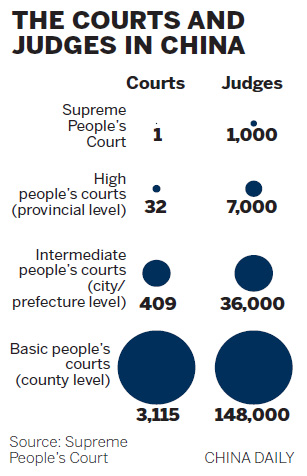Prime
Top court makes case for more local judges
Updated: 2011-02-16 07:53
By Wang Jingqiong (China Daily)

BEIJING - With social disputes increasing and becoming more complicated as China has continued its economic development, the nation's court system is facing a growing challenge to hear the rising number of cases and pacify the people involved, the top court said on Tuesday.
Social disputes usually refer to non-criminal cases involving such things as property ownership, payment of wages, disagreements between patients and hospitals and so on.
The Supreme People's Court (SPC) announced that it will make further efforts to keep up, including the distribution of more financial aid and human resources.
Most of the improvements will be directed at county-level courts where the vast majority of such cases are handled.
In 2010, the country's 3,115 county-level courts and their 148,000 judges heard about 9.34 million cases. The files comprised 89 percent of all the cases heard by the courts nationwide, according to the latest statistics from the top court.
"To solve the increasing social and economic problems, the county-level courts, where 80 percent of the country's judges work and where almost 90 percent of cases are heard, play a key role," said Sun Jungong, a spokesman for the SPC.
The top court also requires higher courts to help and supervise the lower courts, especially in cases that have significant social impact.
"Recently, cases involving people's welfare, including those caused by the changing loan policy, labor disputes, education and rural land confiscation have become more and more complicated," said Sun.
Du Wanhua, president of the No 1 Civil Tribunal under the SPC, said the courts are also trying to highlight cases that could have a significant impact on other people.
"We are establishing a risk evaluation system for important cases that might have an impact on social stability and cases with difficulty in the application of the law," said Du. "Our goal is to ensure disputes do not continue after the trial."
Sun said many county-level courts have had to deal with a scarcity of judges, especially in the less-developed central and western areas of the country.
"It has been a long-term problem that very few judges want to go to work in the less-developed provinces, and even those who work there want to leave after two or three years, which leaves a shortage of judicial resources there," Du said.
The court system is encouraging each province to recruit local people to work in their local courts in a bid to solve the problem, Du said.
The SPC is also working with the Ministry of Justice to reform the National Judicial Examination, the annual test that candidates must pass on the road to becoming a lawyer, judge or prosecutor.
"We suggest that, for less-developed areas, the demand and score should be lowed for one to pass the exam and become a judge," Du said. "We are also increasing communication between higher courts and lower courts, so that more experienced judges will temporarily go to lower courts to work."
China Daily
Specials

Spring Festival
The Spring Festival is the most important traditional festival for family reunions.

Top 10
A summary of the major events both inside and outside China.

A role model
Alimjan Halik had been selected as the "Cyberspace Personality Who Moved the Hearts of the Chinese in 2010".